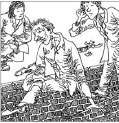By Raymond Zhou

Does rule of law necessitate the elimination of good Samaritans?
While our rule of law has plenty of room for improvement, our good Samaritans received a major blow, if not the coup de grace, when a court of law in Nanjing found Peng Yu guilty and sentenced him to pay 45,876 yuan in damages.
Last November, when an old lady fell while getting off a bus, Peng offered help, taking her to a hospital. Later, she sued him for 130,000 yuan, accusing him of causing her fall and bone fracture.
During deliberation, the court reasoned that if Peng had not knocked her down in the first place, he would have no intention to seek medical service for her.
That reminds me of the instructions I received when I first arrived in America: Never, ever, help an old lady who collapses on a street. You might get sued.
"So, what should I do?" I asked.

"You should immediately call the cops," I was told.
"What if a car is speeding towards her and there is no time for a cop to jump to her rescue?" I persisted.
My friend looked at me as if I were from another planet.
Several years later, a friend of mine joined me in Berkeley. I relayed to him the same advice, but he wouldn't listen. One day, he told me he saw a middle-aged lady pushing two bikes across a street, something I thought one could see only in China. Out of kindness, he offered to push one for her. Wanting to practice his beginner's English, he walked the whole way with her.
After they parted, she found her wallet was gone and accused him of stealing it. "Why would I leave her my address and phone number if I had stolen something from her?" he cried.
I trusted my friend. He was fresh off the boat and hadn't learned the way of the world yet. The lady could have lost her wallet on her own or had it stolen by somebody else. Anyway, my friend vowed never to do something like that again.
In China, the good Samaritan is personified by Lei Feng, the young soldier whose deeds are hammered into the minds of every new generation. Stripped of political glorification, he is just a symbol of decency, altruism and compassion, which is the real value of this role model.
Things got complicated when our society opened up. Protection of one's individual rights is no longer brushed aside. Sacrificing oneself while rescuing someone else, especially for the underaged, is not encouraged any more. But where is the line between lawful protection of self-interests and random acts of selflessness?
There has been a spate of reports of bystanders who did nothing to save someone in distress, such as a kid drowning. On the other hand, there are also incidents of people who went out of their way to help others, and in the process hurt themselves and incurred huge medical bills.
Is the first group too cold-hearted? Is the second one too foolish? What is the right thing to do? There are things one should definitely leave to the cops, such as fighting gangsters. But calling a cop to help a swooning lady just sounds a bit too methodical and pretentious.
Fortunately, governments are taking a stand. Guangzhou has announced that it will raise the award significantly for good Samaritans. For example, a person who loses his life while helping others will have 300,000 yuan go to his family, instead of the original 50,000.
A new question arises: Detractors are saying people do good deeds for the money.
Email: raymondzhou@chinadaily.com.cn
(China Daily 10/20/2007 page4)
我要看更多专栏文章